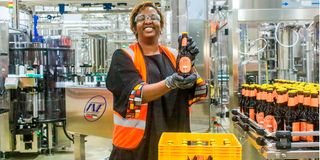EABL shakes up craft beer market with launch of new microbrewery

Director, Marketing and Innovation at East African Breweries Ltd Kenya Anne Joy Michira during the launch of a micro-brewery and Manyatta Cider drinks on 27th November at Kenya Breweries Ltd in Nairobi.
What you need to know:
- The new microbrewery at Ruaraka, Nairobi is set to serve as an innovation centre for the ever-growing appetite for craft beer.
- EABL will start with four different flavours in the market under the brand name Manyatta. In the coming days, they will have Manyatta Cider, Manyatta Lemon and Ginger, Manyatta Mango and Ginger, and Mayatta Pineapple Mint.
East African Breweries Plc (EABL) has opened a new microbrewery to tap into the craft beer market.
The new microbrewery at Ruaraka, Nairobi is set to serve as an innovation centre for the ever-growing appetite for craft beer which has in the last couple of years taken a liking from drinkers, most of whom do not like the taste of traditional beer.
The new microbrewery is expected to help the brewer, which is controlled by Britain’s Diageo and is known for its flagship Tusker beer, to test the niche market for craft beer which analysts say has until recently been ignored by major brewers globally.
Craft beer is made in a traditional or non-mechanised way by a small brewery and is seen to emphasise flavour and quality.
Jane Karuku, EABL managing director said that the craft beer market has potential for growth in Kenya adding that EABL is mindful of the craft beer trend.
“It is a good day as we launch the new microbrewery after 18 months of construction. It gives us the flexibility of producing small innovative brands,” she said during the launch.

Models pose for a photo during the launch of a micro-brewery and Manyatta Cider drinks on 27th November at Kenya Breweries ltd in Nairobi.
The production process of craft beer can take from 14 days to several months depending on the type of alcohol. They can be more full-bodied with richer flavours than other beers because brewers use different hops and malts such as fruit-based ciders, caramel and chocolate.
EABL will start with four different flavours in the market under the brand name Manyatta. In the coming days, they will have Manyatta Cider, Manyatta Lemon and Ginger, Manyatta Mango and Ginger, and Mayatta Pineapple Mint.
Craft beers have seen a growing fan base in Kenya.
“People want to have more intimate things for special occasions. Once you get a good craft then you can commercialise it and you can go big on it. We are just getting into experimenting,” Ms Karuku said.
EABL is joining craft beer markers such as Bila Shaka, Sierra, and 254 breweries. Other smaller microbreweries include Crafty Chameleon and The Kraft.
Currently, there are about 12 breweries and microbreweries in Kenya, producing everything from crafts that have local names, to some with mango and ginger flavours, to those that have low alcohol content.
One of them is the Brewery and Beergarden Restaurant which opened in December 2022, in Lavington, Nairobi.
Arjun Malhotra, founder of Crafty Chameleon which runs Brewery and Beergarden Restaurant says that they converted an old colonial residential house into a brewery and restaurant, keeping the old and green charm of the place where they specialise in craft beers that are all made on-site where restaurant guests can watch.
EABL has also in a way taken the same concept where there will be a tasting room for visitors to learn and sample the various brews.
The brewer further added that there will be a taproom (consisting of a bar and restaurant).
“The taproom will lead the local entertainment scene by providing a unique, engaging customer experience with great food, drinks, and entertainment options. There shall be a beer garden that provides a scenic view of the Ruaraka area,” the brewer said.
While craft brews are becoming popular among beer lovers, their high retailing costs are the single biggest drawback to their growth in Kenya.
The high prices are due to the importation of brewery equipment and ingredients such as hops which do not grow in tropical countries.
The microbrewers, however, foresee better prospects given the growing middle and upper-middle-class population who account for craft beer clientele.




